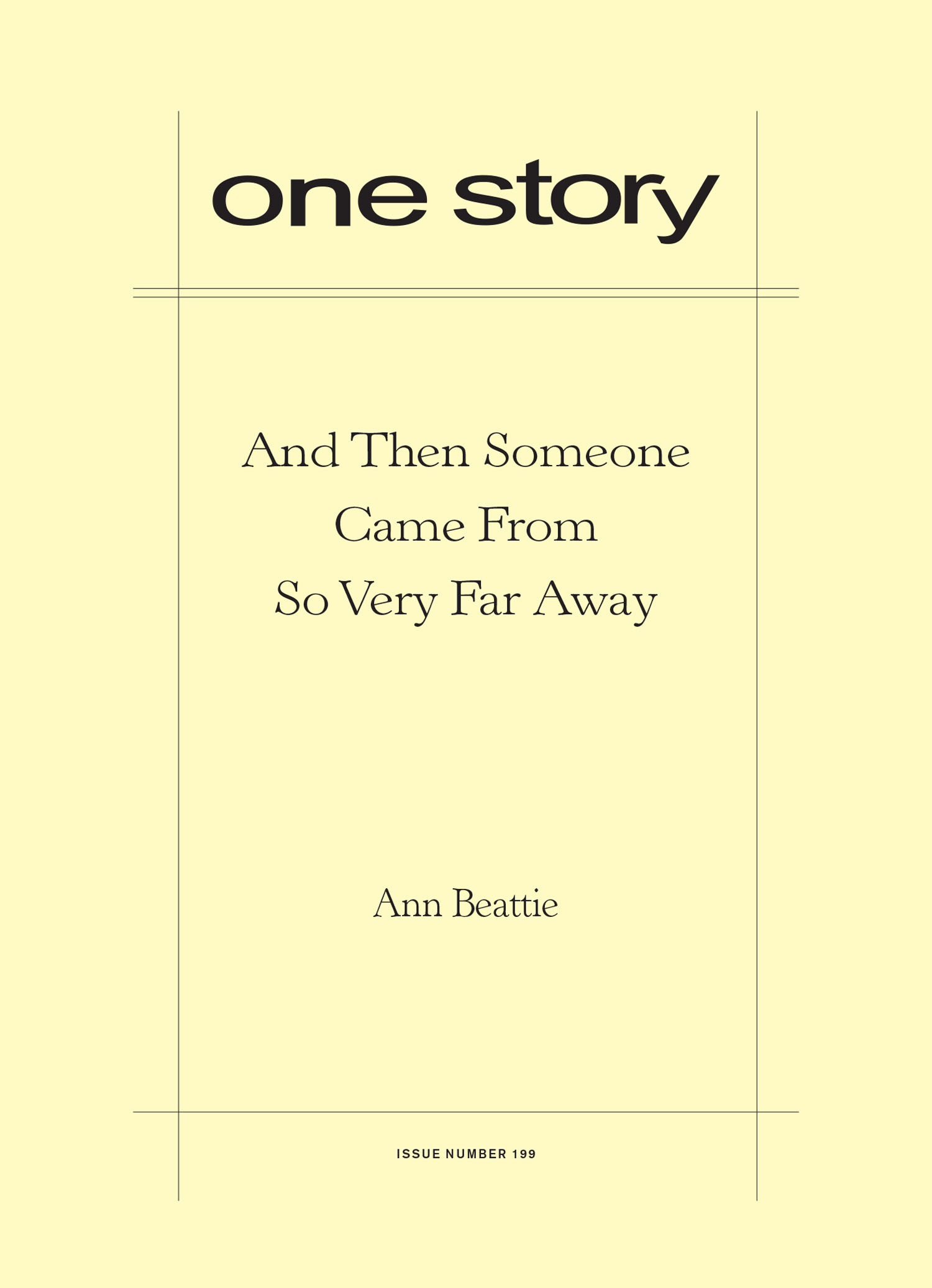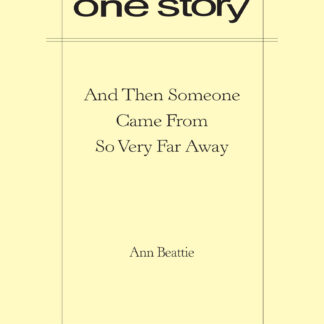
And Then Someone Came From So Very Far Away
$2.50
30 in stock
Excerpt
The idea to sell her desserts at the farmers’ market was not Nona’s, but when her sister Prue said it, Nona’s husband instantly agreed it was what she should do. Whatever she baked was wonderful, and always so inventive and conversation-inspiring.
Nona’s husband, Worth, was between jobs. Or, if head hunters didn’t find anything for him, he was retired at fifty-eight—though the buyout he’d taken from his previous job made both of them feel a bit less sour about the company he’d worked for. Everyone else hated their former employers, resented their belittling offers of settlement, but Worth had landed on his feet, feeling better than when he’d first heard about the company’s New England branch closing.
Prue had arrived at Nona and Worth’s house for a visit in early August. Except for the upcoming Labor Day weekend, Maine was already emptier of cars and tourists. Today was an overcast, cool day at the farmers’ market. No doubt the relative peacefulness was what made the Jam Lady talkative. Jam Lady and her awful husband Howard had invited the three of them to a cookout the previous week, and Nona had brought a peach pie with almonds. She’d used a little rye flour in the crust with unsalted butter. The peaches had been combined with some diced kumquats, and instead of the usual raisins, Nona had added ground walnuts as well as the almonds, mixed with toasted pignoli, and as a last- minute inspiration, a tablespoon of red basil from the garden. The pie had been a big success.
Ann Beattie
Ann Beattie’s The New Yorker Stories was named one of the ten best books of 2010 by the New York Times. Scribner will publish her new collection, The State We’re In: Maine Stories in 2015. She is a member of the American Academy of Arts and Letters and the American Academy of Arts and Sciences. She and her husband live in Maine and Key West.
Patrick Ryan on “And Then Someone Came From So Very Far Away”
There’s a phenomenon that occurs in an Ann Beattie story that always lets me know I’m reading an Ann Beattie story. The most apt comparison I can think of is that it’s a little like watching a Robert Altman film (when Altman was at the top of his game)—but in Beattie’s stories, instead of the characters all talking for their lives, they’re thinking for their lives. Even when we’re tethered to the thoughts of a single character, there’s a staccato of observations, conclusions, and second-guessing going on—all of it pinballing through outside stimuli.
In the case of “And Then Someone Came From So Very Far Away,” much of the outside stimuli arises from a farmers’ market. If you’ve spent any time at all in a busy farmers’ market and wondered at its bustle not just of commerce but of personalities, you’ll know what an accurate portrait of that environment Beattie has created here. And, more importantly, at the heart of this story is another portrait: Nona and Prue—two sisters in their later years, each trying to help the other out emotionally, and each doing a less than perfect job of it.
No proper introduction of this wonderful story would be complete without mentioning the pies. The pies! You’ll be entranced by the care and inventiveness Nona puts into her baking. You’ll smell the pies as Prue cradles them and boxes them up. And a little part of you—probably nestled in the pit of your stomach—will ache as those pies are bought and carried away by people who aren’t you. Still, “And Then Someone Came From So Very Far Away” doesn’t belong to the pies; it belongs to the sisters, both of whom I fell a little bit in love with.
We’re delighted to be publishing this new story by the legendary Ann Beattie. It will both fill you up and leave you wanting more: more Nona, more Prue, more Beattie.
Q&A by Patrick Ryan
- PR: Where did the idea for this story come from?
- AB: As you’d expect, from going to the Saturday farmers’ market. Also, I’d just seen the Woody Allen film. I had also met someone named Prue. And meeting Prue made me think of To the Lighthouse.
- PR: What was the most challenging aspect of writing this story?
- AB: Not making the overwhelmed young mother a stereotype and not doing more with her than I did. She could have derailed the story.
- PR: What did you enjoy the most?
- AB: Seeing the little boy in my mind, near the end, digging, oblivious, an obstacle everyone had to get around. I guess he became a stand-in, at that point, for what writing a story is, at the most basic level.
- PR: I have to ask—do you bake? Was all this pie information already in your head?
- AB: I cook all the time and really have worshipful feelings about my herb garden, but I never bake.
- PR: You capture the atmosphere of a farmers’ market perfectly. I go to one every week, and now, having read your story, I can’t do my shopping without feeling like I’m one of your characters (which isn’t a bad thing). What was it about that atmosphere that made you want to write about it?
- AB: All those people who work privately, growing things, baking, canning—and then they go public.
- PR: This is, in large part, a story about siblings—Nona and Prue. But it’s also a very intimate journey into what it’s like to be Nona, the married sister who does all the baking. Do you feel like the story is more Nona’s than it is Nona and Prue’s?
- AB: I think of it as Nona’s story.
- PR: How long did it take you to complete this story?
- AB: I always revise and fine tune extensively, but the first draft probably took about 3 hours.
- PR: Will “And Then Someone Came From So Very Far Away” be included in your upcoming collection (The State We’re In: Maine Stories)? And can you tell us a little about the book? How many years’ worth of stories does it cover?
- AB: The honest answer is that it covers one summer’s story writing. Fifteen stories, this one not among them, only because of the shape or trajectory of the book.
- PR: What are you working on now?
- AB: Awaiting the copyedited manuscript of the book in two days.
- PR: What is the best bit of advice about writing you have ever received?
- AB: I really try to ignore good advice about writing, but some has seeped through. Today what I remember is the advice to sleep on it, or to take a walk. Also, try not to find solutions to particular writing problems by obsessing. My husband pointed out problems in a really long story recently, a 70-something page story. The next morning, I woke up knowing it was two stories: the beginning part a standalone story, and the ending part another story. So I dropped out the 25 pages in the middle.
